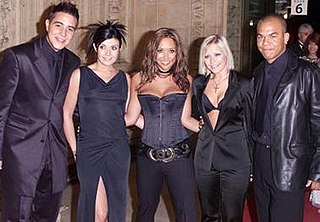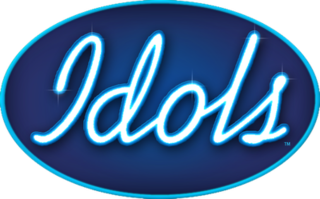
American Idol is an American singing competition television series created by Simon Fuller, produced by Fremantle North America and 19 Entertainment, and distributed by Fremantle North America. It aired on Fox from June 11, 2002, to April 7, 2016, for 15 seasons. It was on hiatus for two years until March 11, 2018, when a revival of the series began airing on ABC.

Pop Idol is a British music competition television series created by Simon Fuller which ran on ITV from 2001 to 2003. The aim of the show was to decide the best new young pop singer in the UK based on viewer voting and participation. Two series were broadcast, one in 2001–2002 and a second in 2003. An immense success when it launched in 2001, Maggie Brown in The Guardian wrote, "the show became a seminal reality/entertainment format once on air that autumn". Series judge Simon Cowell became a major public figure in entertainment, and the show produced instant No. 1 chart hits, including for the first series winner Will Young, whose single "Evergreen" was the fastest-selling debut in UK chart history and the best-selling song of 2002. Pop Idol was subsequently put on an indefinite hiatus after Simon Cowell announced the launch of The X Factor in the UK in April 2004.

Australian Idol is an Australian singing competition, which began its first season in July 2003 and ended its initial run in November 2009. As part of the Idol franchise, Australian Idol originated from the reality program Pop Idol, which was created by British entertainment executive Simon Fuller. Australian Idol was televised on Network Ten for its first seven series and was broadcast on the Southern Cross Austereo Radio Network between 2005 and 2007. The series returned in 2023 after Seven Network announced they would be picking up the show.

Nashville Star is an American reality television singing competition program that aired for six seasons, from 2003 to 2008. Its first five seasons aired on USA Network, while the last season aired on NBC. Its five seasons on USA made it the longest-running competition series on cable television at the time. In Canada, the show aired on CMT through season 5, but moved to E! beginning with season 6. CMT in the United States reaired each episode in season 6.

Hear'Say were a British pop group. They were created through the ITV reality TV show Popstars in February 2001, the first UK series of the international Popstars franchise. The group, who were signed to Polydor Records, originally consisted of Danny Foster, Myleene Klass, Kym Marsh, Suzanne Shaw, and Noel Sullivan.

Idol is a reality television singing competition format created by British television producer Simon Fuller and developed by Fremantle. The format began in 2001 with the British television series Pop Idol; its first adaptation was the South African series Idols in 2002. It has since become the world's most widely watched television franchise, as well as one of the most successful entertainment formats, adapted in over 56 regions around the world, with its various versions broadcast to 150 countries with a worldwide audience of roughly 3.2 billion people. The franchise has generated more than $2.5 billion in revenue.
Kayne Taylor is a pop music singer from Melbourne, Victoria who won the 2004 Australian series of Popstars Live. Taylor started singing in 1994 and can also play bass and guitar.
New Zealand Idol, also known as NZ Idol, was the New Zealand version of the Idol series which originated in the United Kingdom as Pop Idol. New Zealand first saw the Idol format when TV2 aired American Idol 2, which garnered impressive ratings. After Australian Idol also received good ratings in New Zealand, TVNZ decided to order the first season of NZ Idol, which was broadcast on TV2. After the third season in 2006, TVNZ made a decision not to fund or broadcast a fourth season.

Kara Elizabeth DioGuardi is an American songwriter, record producer, music publisher, A&R executive, and singer. She primarily writes music in the pop rock genre. She has worked with many popular artists; sales of albums on which her songs appear exceed 160 million worldwide. DioGuardi is a 2011 NAMM Music for Life Award winner, 2009 NMPA Songwriter Icon Award winner, 2007 BMI Pop Songwriter of the Year, and has received 20 BMI Awards for co-writing songs.

Indonesian Idol is an Indonesian reality television singing competition created by Simon Fuller and produced by RCTI Production Team and FremantleMedia Asia. The show began airing on RCTI in March 2004 and became one of the most popular shows in the history of Indonesian television. Part of the Idol franchise, it was as a spin-off from the UK show Pop Idol.

The X Factor is an Australian television reality music competition, based on the original UK series, to find new singing talent. The first season of the show premiered on Network Ten on 6 February 2005. Ten dropped The X Factor after the first season due to its poor ratings. In 2010, the Seven Network won the rights to the show, and a second season went into production. The X Factor was renewed after the highly successful Australian Idol was no longer broadcast on Network Ten. The X Factor was produced by FremantleMedia Australia, and was broadcast on the Seven Network in Australia and on TV3 in New Zealand. The program was cancelled after its eighth season in 2016.
Idols is a Finnish reality-television singing competition that airs on Nelonen. It debuted in the summer of 2003, and went on to become one of the most popular shows on Finnish television. Part of the Idol franchise, it originated from the reality program Pop Idol created by British entertainment executive Simon Fuller, which was first aired in 2001 in the United Kingdom.

"Angels Brought Me Here" is a pop song by Australian singer-songwriter Guy Sebastian. It was released in Australia on 24 November 2003 as the lead single from his debut album, Just as I Am (2003). The song was written by Jörgen Elofsson and John Reid for Network Ten's TV talent competition, Australian Idol's inaugural season. Recorded versions were made for both grand finalists, Sebastian and Shannon Noll, with only Sebastian's version officially released by BMG. On 22 November the promotional video had premiered on the same network's Video Hits – produced by Australian Idol's Stephen Tate and directed by its musical director, John Foreman.

Idol is a Swedish reality-competition talent show broadcast on TV4. It first appeared in August 2004, and became one of the most popular shows on Swedish television. Part of the Idols franchise, it originated from the reality program Pop Idol created by British entertainment executive Simon Fuller, which was first aired in 2001 in the United Kingdom.
The fifth season of Australian Idol premiered on 5 August 2007 on Network Ten. It concluded on 25 November.
The first season of Australian Idol was produced by Fremantle Media subsidiary Grundy Television in association with UK company 19TV, and was broadcast on Network Ten for 19 weeks in the latter half of 2003. The judges were Mark Holden, Marcia Hines and Ian "Dicko" Dickson.

Popstars: The Rivals is a British television talent show series, broadcast on ITV in late 2002. It was the second UK series of the international Popstars franchise. Unlike Popstars, which resulted in the formation of one winning group, Hear'Say, Popstars: The Rivals created two rival groups, Girls Aloud and One True Voice, who competed for the Christmas number one spot on the UK Singles Chart. Girls Aloud won and went on to nearly achieve 20 consecutive top-ten hits, including four number ones, and six top-ten albums, two of which reached number one. Group member Cheryl has achieved five solo number-one singles and two number-one albums.
The first series of British reality television show Pop Idol was broadcast on ITV in the United Kingdom during the winter months of 2001 and 2002. The show was a singing competition open to people aged between 16 and 26 years old, with the winner receiving a £1 million recording contract to release their debut album. Pop Idol received ratings of as high as 10 million viewers for shows before the live final. The footage of the programme's opening titles, as well as the live final of this series, was used in the first season of American Idol, which began over four months after the airing of the live final, in which Kelly Clarkson won the season.

Pop Idol was a British television talent show that ran for two series, in 2001 and 2003. The show was produced for ITV in a reality television format and aimed to unearth a previously undiscovered singer who could become an international success. Will Young was the winner of the first series and was awarded with a £1 million music recording contract. Young became the most successful contestant with a series of top-five hits, including his debut single "Anything Is Possible" / "Evergreen", which peaked at number one on the UK Singles Chart in 2002 and broke chart sales figure records. During the next seven years he recorded two further number-one singles, while two of his four albums were number-one in the UK Albums Chart. In the second series, Michelle McManus emerged victorious. Her debut single "All This Time" charted at number one in January 2003. Her second single, "The Meaning of Love", charted at a peak of number 16 and an album of the same name reached number three in the UK Albums Chart.

Popstars is a reality music competition series that was broadcast on ITV in early 2001. It was the first British series of the international Popstars franchise and was billed as a documentary on the formation of a modern pop group. The programme began with audition rounds of aspiring singers performing covers of classic songs before a panel of judges. The best performers were selected to come to London for further rounds of auditions. Over the weeks, the judges eliminated various singers from the auditions until just a few singers were left in contention. In the final weeks, five contestants were chosen by the judges to form the new pop group Hear'Say. The programme then showed the group recording and promoting their first single, documenting their first ventures into the music industry.













